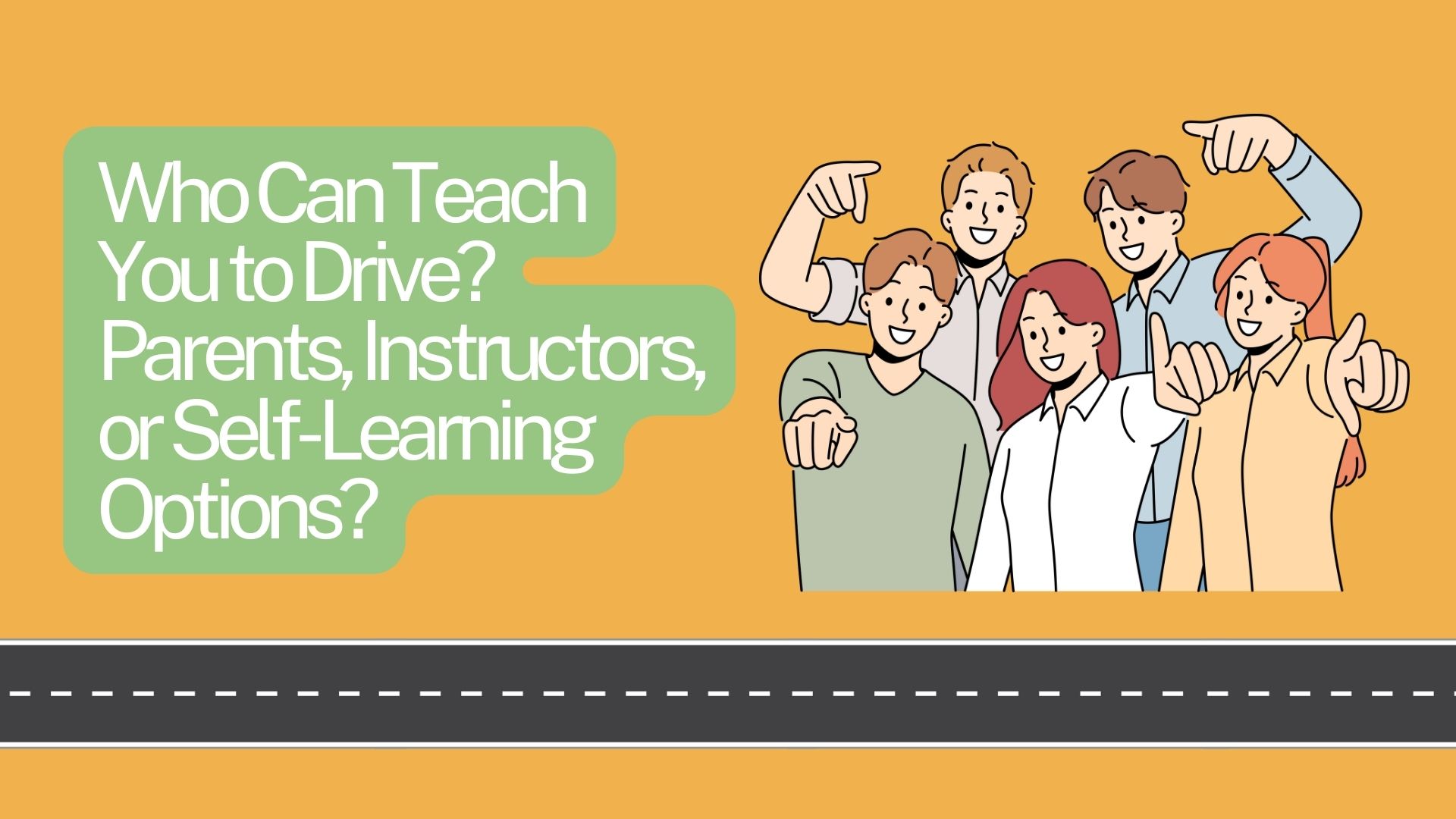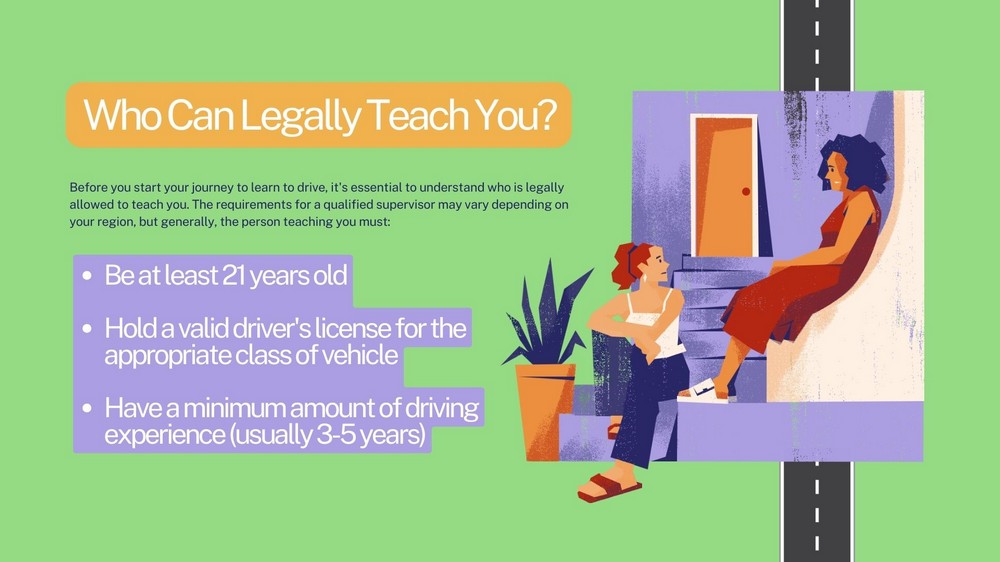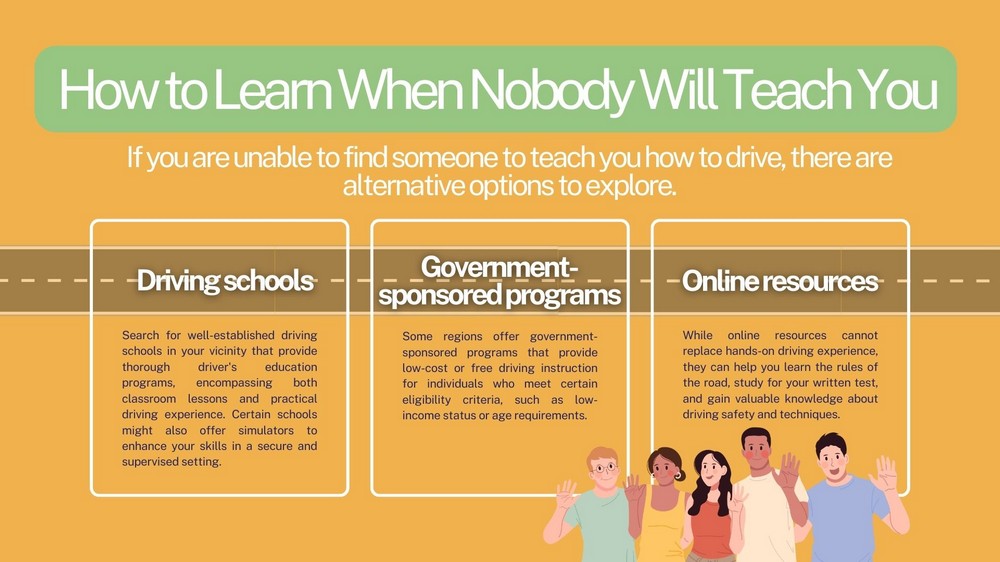Who Can Teach You to Drive? Parents, Instructors, or Self-Learning Options?

Table of Contents
- Who Can Legally Teach You?
- Do You Need a Driving Instructor?
- Who Can Legally Teach You?
- Learning to Drive with Parents/Friends
- How to Learn When Nobody Will Teach You
- Driving Test and Driving Instructors
- Learning Without Parents
- Can You Teach Yourself How to Drive?
- Additional Tips
- Your Journey to Becoming a Safe and Confident Driver
Learning to drive is an exciting milestone for many teenagers and young adults. The feeling of freedom and independence that comes with obtaining a driver's license is unmatched. However, the process of learning to drive can also be nerve-wracking and overwhelming. One of the first questions that often comes to mind is, "Who can teach you to drive?"
In this article, we'll explore the various options available for new drivers seeking to learn to drive, including professional driving instructors, parents, and other licensed family members or friends. We'll also discuss the legal requirements for teaching someone to drive and provide tips for making the learning process as smooth and effective as possible.
Who Can Legally Teach You?
Before diving into the different options for learning to drive, it's important to understand the legal requirements for teaching someone to drive. In most regions, the person teaching you to drive must meet certain criteria, such as:
- Being at least 21 years old
- Holding a valid driver's license for the appropriate class of vehicle
- Having a minimum amount of driving experience (usually 3-5 years)
The most common options for learning to drive include:
- Parents or legal guardians
- Licensed family members or friends (over 21 with appropriate experience)
- Professional driving instructors
It's crucial to ensure that whoever is teaching you to drive meets the legal requirements in your area to avoid any potential issues or fines.
Do You Need a Driving Instructor?
While it's possible to learn to drive from a parent, family member, or friend, there are several benefits to working with a professional driving instructor. Here are some pros and cons to consider:
|
Pros |
Cons |
|
Structured learning environment |
Higher cost compared to learning from family/friends |
|
Experienced guidance and personalized feedback |
Less flexibility in scheduling |
|
Potential insurance discounts for completing a certified course |
Limited one-on-one time if learning in a group setting |
Ultimately, the decision to work with a professional driving instructor depends on your individual learning style, budget, and personal preferences. Some people may thrive in a structured learning environment with an experienced instructor, while others may prefer the comfort and familiarity of learning from a parent or friend.
Call Us Today 6AM-10PM
Or fill out the form 24/7
Our team is here to guide you with promotions, instructor availability, and the best training package for you.
Who Can Legally Teach You?

Before you start your journey to learn to drive, it's essential to understand who is legally allowed to teach you. The requirements for a qualified supervisor may vary depending on your region, but generally, the person teaching you must:
- Be at least 21 years old
- Hold a valid driver's license for the appropriate class of vehicle
- Have a minimum amount of driving experience (usually 3-5 years)
Parents or Legal Guardians
In most cases, your parents or legal guardians are allowed to teach you how to drive, as long as they meet the above requirements. Learning to drive with parents can be a convenient and cost-effective option, as it allows for more flexibility in scheduling and a familiar learning environment.
However, it's important to keep in mind that not all parents are equipped to be driving instructors. They may have developed bad habits over the years or lack the necessary teaching skills to effectively guide you through the learning process.
Licensed Family Members or Friends
Another option is to learn from a licensed family member or friend who meets the legal requirements. This can be a good alternative if your parents are unable to teach you or if you feel more comfortable learning from someone else.
When choosing a family member or friend to teach you, make sure they are patient, responsible, and have a good driving record. It's also crucial to establish clear communication and expectations to maintain a positive learning experience.
Professional Driving Instructors
Professional driving instructors are licensed and trained to teach you how to drive. They provide a structured learning environment, experienced guidance, and personalized feedback to help you become a safe and confident driver.
|
Advantages of Professional Driving Instructors |
Disadvantages of Professional Driving Instructors |
|
Comprehensive driving lessons that cover all aspects of driving |
Higher cost compared to learning from family or friends |
|
Up-to-date knowledge of traffic laws and regulations |
Less flexibility in scheduling |
|
Dual-control vehicles for added safety during lessons |
Potential for inconsistent teaching quality if not thoroughly researched |
|
Potential insurance discounts for completing a certified drivers ed course |
While professional driving instructors may come with a higher cost, many new drivers find that the benefits outweigh the expenses. Investing in quality driving lessons can help you develop the skills and confidence needed to pass your driving test and become a safe, responsible driver.
Learning to Drive with Parents/Friends
If you decide to learn to drive with a parent, family member, or friend, there are several advantages and disadvantages to consider.
Advantages
- Convenience: Learning from a parent or friend allows for more flexibility in scheduling driving practice sessions, as you can work around your mutual availability.
- Familiarity: You may feel more comfortable learning from someone you already know and trust, which can help reduce anxiety and stress during the learning process.
- Cost-effective: Learning from a parent or friend can save you money on professional driving lessons, which can be expensive.
Disadvantages
- Lack of professional expertise: Parents and friends may not have the same level of teaching experience as professional driving instructors, which can lead to gaps in your knowledge or skills.
- Potential for bad habits: Your parent or friend may have developed bad driving habits over the years, which they could inadvertently pass on to you.
- Emotional challenges: Learning from a parent or friend can sometimes lead to arguments or frustration, which can strain your relationship and hinder your progress.
To ensure a successful learning experience with a parent or friend, consider the following tips:
- Choose a patient and qualified supervisor who meets the legal requirements.
- Set clear expectations and establish open communication to maintain a positive learning environment.
- Create a structured lesson plan that covers all the necessary driving skills and knowledge.
- Practice regularly in a variety of driving conditions to gain comprehensive experience.
Call Us Today 6AM-10PM
Or fill out the form 24/7
Our team is here to guide you with promotions, instructor availability, and the best training package for you.
How to Learn When Nobody Will Teach You

If you find yourself in a situation where no one is available or willing to teach you how to drive, don't despair. There are alternative options to consider:
- Driving schools: Look for reputable driving schools in your area that offer comprehensive drivers ed courses, including classroom instruction and behind-the-wheel practice. Some schools may even provide simulators to help you gain experience in a safe, controlled environment.
- Government-sponsored programs: Some regions offer government-sponsored programs that provide low-cost or free driving instruction for individuals who meet certain eligibility criteria, such as low-income status or age requirements.
- Online resources: While online resources cannot replace hands-on driving experience, they can help you learn the rules of the road, study for your written test, and gain valuable knowledge about driving safety and techniques.
Remember, while it may be tempting to try to teach yourself how to drive, it is strongly advised against due to safety concerns and legal restrictions. In most regions, you are required to have a licensed supervisor with you when learning to drive.
Driving Test and Driving Instructors
In some regions, you may be required to take driving lessons with a professional driving instructor before you can take your driving test. Even if it's not mandatory, taking driving lessons with an instructor can be beneficial in preparing you for the test and helping you feel more confident behind the wheel.
Professional driving instructors are familiar with the specific requirements and expectations of the driving test in your area, and they can provide targeted feedback and guidance to help you succeed. They can also help you develop strategies for managing test anxiety and staying focused during the exam.
Learning Without Parents
If your parents are unable or unwilling to teach you how to drive, don't worry – there are still plenty of options available to you. The most important thing is to find a qualified and responsible supervisor who meets the legal requirements in your area.
As mentioned earlier, you can consider learning from another licensed family member or friend, or you can opt for professional driving lessons with a certified driving instructor. Driving schools offer structured drivers ed courses that can provide you with the knowledge and skills you need to become a safe and confident driver.
If cost is a concern, look for government-sponsored programs or low-cost driving schools in your area. Some regions offer subsidized or free driving lessons for individuals who meet certain eligibility criteria, such as low-income status or age requirements.
Regardless of who you choose to learn from, it's crucial to find a supervisor who is patient, responsible, and committed to helping you succeed. Look for someone who has a good driving record, a calm demeanor, and a willingness to invest time and energy into your learning process.
Can You Teach Yourself How to Drive?
While it may be tempting to try to teach yourself how to drive, it is strongly advised against for several reasons:
- Safety concerns: Driving is a complex skill that requires knowledge, practice, and guidance from an experienced supervisor. Attempting to teach yourself can put you and others on the road at risk.
- Legal restrictions: In most regions, it is illegal to drive without a licensed supervisor in the vehicle until you have passed your driving test and obtained your license.
- Lack of feedback: Teaching yourself how to drive means you won't have access to the valuable feedback and guidance that a qualified supervisor can provide. This can lead to the development of bad habits or gaps in your knowledge and skills.
Instead of trying to teach yourself, focus on finding a qualified supervisor who can provide you with the instruction and support you need to become a safe and responsible driver.
Additional Tips
- Familiarize yourself with your region's driver's handbook: Every region has its own specific rules and regulations when it comes to driving. Make sure to study your local driver's handbook thoroughly to understand the laws and expectations in your area.
- Take advantage of online resources: There are many online resources available that can help you prepare for your written test, practice your driving skills, and stay up-to-date on the latest traffic laws and safety recommendations. Look for reputable websites, apps, and online courses that offer comprehensive and engaging content.
- Invest in quality driving education: While it may be tempting to cut corners or opt for the cheapest option, investing in quality driving lessons and drivers ed courses can pay off in the long run. Look for certified instructors and reputable driving schools that have a proven track record of success.
How Many Hours of Drivers Ed are Required?
The number of drivers ed hours required varies by region, so it's important to research the specific regulations in your area. In some cases, you may be required to complete a certain number of classroom hours and/or behind-the-wheel training with a certified instructor.
Even if your region doesn't have a mandatory minimum, it's still recommended to invest in a comprehensive drivers ed course that goes beyond the basics. The more time and effort you put into your driving education, the better prepared you'll be to handle the challenges and responsibilities of driving.
Your Journey to Becoming a Safe and Confident Driver
Learning to drive is an exciting and important milestone, but it's crucial to approach the process with care and responsibility. By understanding the legal requirements for teaching someone to drive and exploring the various options available to you, you can find the best path forward for your unique situation.
Whether you choose to learn from a parent, family member, friend, or professional driving instructor, the key is to find a qualified and patient supervisor who can guide you through the process and help you develop the skills and knowledge you need to become a safe and confident driver.
Remember, investing in quality driving education is an investment in your future. With the right guidance and dedication, you'll be cruising down the road with your newfound freedom and independence in no time!
Call Us Today 6AM-10PM
Or fill out the form 24/7
Our team is here to guide you with promotions, instructor availability, and the best training package for you.
Frequently Asked Questions
-
1. Can I legally teach my child how to drive?
Yes, in most regions, parents or legal guardians are allowed to teach their children how to drive, as long as they meet the minimum age requirement (usually 21), hold a valid driver's license, and have a minimum amount of driving experience (typically 3-5 years).
-
2. Is it better to learn from a parent or a professional driving instructor?
Both options have their advantages and disadvantages. Learning from a parent can be more convenient, familiar, and cost-effective, while professional driving instructors provide a structured learning environment, experienced guidance, and personalized feedback. Ultimately, the best choice depends on your individual learning style, budget, and personal preferences.
-
3. What are the benefits of taking drivers ed courses?
Drivers ed courses offer comprehensive driving lessons that cover all aspects of driving, including traffic laws, safety techniques, and defensive driving strategies. Many courses also provide potential insurance discounts and help prepare you for your driving test.
-
4. How many hours of driving practice do I need before taking my driving test?
The number of practice hours required varies by region, but it's generally recommended to have at least 50-100 hours of supervised driving practice before taking your test. This ensures that you have enough experience in various driving conditions and scenarios.
-
5. What should I do if I don't have anyone to teach me how to drive?
If you don't have a parent, family member, or friend who can teach you how to drive, consider looking for reputable driving schools in your area or government-sponsored programs that provide low-cost or free driving instruction. You can also utilize online resources to supplement your learning, but remember that hands-on practice is essential.
-
6. Can I teach myself how to drive?
No, it is strongly advised against teaching yourself how to drive due to safety concerns and legal restrictions. In most regions, you are required to have a licensed supervisor with you when learning to drive.
-
7. How do I choose the right driving instructor?
When selecting a driving instructor, look for someone who is licensed, experienced, and has a good reputation. Read reviews from previous students, ask for recommendations from friends or family, and make sure the instructor is patient, knowledgeable, and committed to your success.
-
8. What should I do if I have a bad experience learning from a parent or friend?
If you have a negative experience learning from a parent or friend, have an open and honest conversation about your concerns. If the situation doesn't improve, consider switching to a professional driving instructor or another qualified supervisor to ensure a positive and productive learning environment.
-
9. How much do driving lessons typically cost?
The cost of driving lessons varies depending on your location and the type of instruction you choose. On average, you can expect to pay between $50 and $100 per hour for professional driving lessons. Some driving schools offer package deals or discounts for bulk lessons, so be sure to shop around and compare prices.
-
10. What should I do if I'm feeling nervous or anxious about learning to drive?
It's normal to feel nervous or anxious when learning to drive. To help manage these feelings, take deep breaths, practice relaxation techniques, and communicate openly with your driving instructor or supervisor. Remember that everyone learns at their own pace, and with time and practice, you'll gain confidence and skill behind the wheel.
 English
English Spanish
Spanish 

